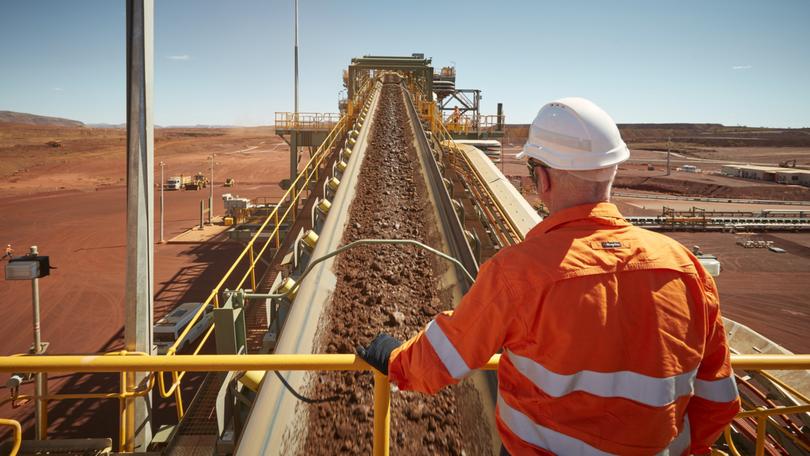‘Unthinkable’: Chamber of Minerals Energy WA boss blasts unionisation threat at BHP Pilbara sites
One of the nation’s most prominent mining lobby groups says the looming prospect of unionisation in Western Australia’s economically vital Pilbara region threatens the nation’s energy transition.

One of Australia’s most prominent mining lobby groups says the looming prospect of unionisation in WA’s economically crucial Pilbara region threatens the nation’s energy transition.
New Federal laws brought in earlier this year have enabled unions to start collective bargaining without majority support of the workforce they represent.
This has forced BHP to the negotiating table in a move that could spark a wave of unionisation in the Pilbara after more than a decade of big miners keeping unions out of their operations in the region.
Sign up to The Nightly's newsletters.
Get the first look at the digital newspaper, curated daily stories and breaking headlines delivered to your inbox.
By continuing you agree to our Terms and Privacy Policy.A team of union leaders, operating under the banner Western Australian Mine Workers Alliance, is heading there this week to build support among BHP workers at its Area C and South Flank mine.
Chamber of Minerals and Energy WA chief executive Rebecca Tomkinson said the unionisation move could further jeopardise the State’s investment attractiveness and would need to be “carefully considered”.
“CME has previously articulated the economic productivity risks associated with the Federal Government’s industrial relations legislation,” she said.
“It would be unthinkable at this critical juncture of WA’s role in the energy transition if the industry were sent backwards.”
Her comments come a day after the Minerals Council of Australia claimed the unions are trying to capitalise on a loophole in new Federal laws that allows unions to begin bargaining on an agreement within five years of the previous agreement’s expiry.
Industry players say the union is trying to use a barely used agreement that expired in August 2019 to get them back into Area C and South Flank — and potentially put themselves at the heart of a new agreement.
It would be unthinkable at this critical juncture of WA’s role in the energy transition if the industry were sent backwards.
BHP said in a statement on Sunday that the Australian Workers’ Union, the Electrical Trades Union and the Australian Manufacturing Workers’ Union had “unilaterally initiated bargaining” under new Federal laws that passed in February.
“BHP will comply with our obligations under the new section of the Fair Work Act,” a company spokesman said.
On Monday another Pilbara mining giant — Fortescue — also weighed in on the unionisation threat, affirming its employees were among the best paid in the nation.
“Our employees receive some of the highest wages in the country together with other favourable terms and conditions such as six months of paid parental leave, training and development opportunities, and the availability of different rostering arrangements,” a Fortescue spokeswoman said.
“We share a values-based culture with our employees and we listen to issues and resolve them quickly.”
WA Senator and workplace relations spokeswoman Michaelia Cash said the unions’ actions proved that the laws pushed by Prime Minister Anthony Albanese’s government were a “direct attack on Western Australia and our mining industry”.
“His Government has enacted legislation that directly affects the well being of our State and the industry that is the engine room of the nation’s economy,” Senator Cash said.
The WA Mine Workers Alliance involves the AWU and the Mining and Energy Union, which last December officially broke away from the now-troubled CFMEU.
In a statement, MEU WA secretary Greg Busson said miners at BHP “should feel very proud of this breakthrough” and claimed the Big Australian’s approach “contrasts sharply with Rio Tinto”.
“Iron ore miners at Rio Tinto tell me they simply wish to discuss their pay, conditions and rosters,” Mr Busson said.
“But Rio seems determined to continue ignoring them.”
Rio declined to comment on the matter.
Meanwhile Liberal member for Durack Melissa Price lambasted the industrial relations developments as a “union’s’ clumsy attempt of a power grab” that would “do nothing to improve productivity”.
“Whether it be their reckless industrial relations reforms or the proposed Nature Positive Plan, the Albanese Government has showed a consistent lack of regard for the importance of WA’s mining sector,” she said.
Ms Cash also claimed that overseas investment in Australia was being jeopardised.
“We can’t continue to take the resources sector for granted. If you keep moving the goalposts and make it harder to invest, resource companies will choose to invest elsewhere and then no one wins,” she said.
